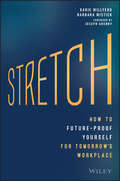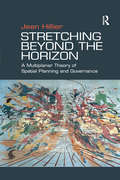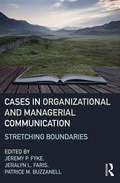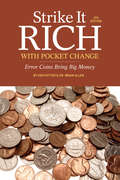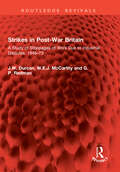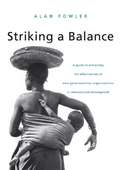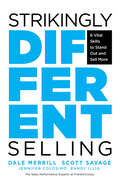- Table View
- List View
Stressbewältigung durch Pflegekräfte: Konzeptionelle und empirische Analysen vor dem Hintergrund des Copings und der Resilienz
by Ingo KlingenbergIn diesem Open-Access-Buch wird das Thema Stressbewältigung von Pflegekräften konzeptionell und empirisch betrachtet. Arbeitsstress nimmt für die meisten Berufsgruppen zu und ist zu einer der häufigsten Ursachen für psychische und physische Erkrankungen geworden. Lange Ausfallzeiten und Frühverrentungen können aus stressbedingten Erkrankungen resultieren. Somit wird Arbeitsstress zunehmend zu einem betrieblichen und gesellschaftlichen Problem. Insbesondere Pflegekräfte sind intensiv von Arbeitsstress betroffen und rücken daher zunehmend in das Interesse der Forschung.Neben der Entstehung und den Auswirkungen von Arbeitsstress, beschäftigt sich die Forschung auch mit dem Thema Stressbewältigung in Form von Coping und Resilienz. Unter Coping werden kognitive Prozesse und Handlungen mit dem Ziel, eine Stressreaktion zu beenden, verstanden. Resilienz bezeichnet die Widerstandsfähigkeit gegenüber Stress. Der wissenschaftlichen Literatur mangelt es bisher an integrativen Modellen, die Coping und Resilienz gemeinsam betrachten. Somit sind die Mechanismen der Stressbewältigung bisher unzureichend erklärt.Es wird daher ein konzeptionelles Modell zur Stressbewältigung entwickelt und auf Pflegekräfte in Form einer qualitativen und einer quantitativen personenzentrierten Analyse angewandt. Die Arbeit liefert verschiedene empirische und konzeptionelle Beiträge zur Stressbewältigung von Pflegekräften im Speziellen, sowie zu Coping und Resilienz im Allgemeinen.
Stressbewältigung: Das Manual zur psychologischen Gesundheitsförderung (Psychotherapie: Praxis)
by Gert KaluzaMit diesem Manual werden Sie fit für die Durchführung des psychologischen Gesundheitsförderungsprogramms: Gelassen und sicher im Stress. Es wird seit über 25 Jahren erfolgreich eingesetzt und von den gesetzlichen Krankenkassen als geprüfte Präventionsmaßnahme gefördert. In Teil I finden Sie Hintergrundwissen aus der Stressforschung: kompakt, fundiert und verständlich. Teil II enthält die Trainingsbausteine: (1) Entspannungstraining: entspannen und loslassen. (2) Mentaltraining: förderliche Denkweisen und Einstellungen entwickeln. (3) Problemlösetraining: Stresssituationen wahrnehmen, annehmen und verändern. (4) Genusstraining: erholen und genießen. (5) Ergänzungsmodule zu Stressbewältigung durch Sport und Bewegung, Pflege des sozialen Netzes, Zielklärung, gesunden Umgang mit der Zeit und der 4xA-Strategie für den Akutfall. Aus dem Inhalt: Didaktische Hinweise für eine kompetente Durchführung des Trainings – abwechslungsreiche Gestaltung durch viele praktisch erprobte Übungen – Teilnehmerunterlagen, die informieren und motivieren – alle Trainingsmaterialien stehen zum Ausdrucken online zur Verfügung. Der Autor: Prof. Dr. Gert Kaluza ist psychologischer Psychotherapeut und als Trainer, Coach und Autor im Bereich der individuellen und betrieblichen Gesundheitsförderung tätig. Nach 20jähriger Tätigkeit an Universitäten gründete er 2002 sein eigenes Fortbildungs- und Trainingsinstitut, das GKM-Institut für Gesundheitspsychologie, das er bis 2022 selbst leitete.
Stressbewältigung: Trainingsmanual zur psychologischen Gesundheitsförderung (Psychotherapie: Praxis)
by Gert KaluzaMit diesem Kursleiter-Manual werden Sie fit für die Durchführung des psychologischen Gesundheitsförderungsprogramms "Gelassen und sicher im Stress". Es wird seit über 20 Jahren erfolgreich eingesetzt und von den gesetzlichen Krankenkassen als geprüfte Präventionsmaßnahme gefördert. In Teil I finden Sie Hintergrundwissen aus der Stressforschung: kompakt, fundiert und verständlich. Teil II enthält Trainingsbausteine in 4 Trainings- und 5 Ergänzungsmodulen: (1) Entspannungstraining: entspannen und loslassen. (2) Mentaltraining: förderliche Denkweisen und Einstellungen entwickeln. (3) Problemlösetraining: Stresssituationen wahrnehmen, annehmen und verändern. (4) Genusstraining: erholen und genießen. (5) Ergänzungsmodule zu Stressbewältigung durch Sport und Bewegung, Pflege des sozialen Netzes, Zielklärung, gesunden Umgang mit der Zeit und der 4xA-Strategie für den Akutfall.Aus dem Inhalt: Didaktische Hinweise für eine kompetente Durchführung des Trainings – abwechslungsreiche Gestaltung durch viele Übungen – Teilnehmerunterlagen, die informieren und motivieren – alle Trainingsmaterialien im Buch stehen zum Ausdrucken für Teilnehmer online zur Verfügung.Der Autor: Prof. Dr. Gert Kaluza ist psychologischer Psychotherapeut und als Trainer, Coach und Autor im Bereich der individuellen und betrieblichen Gesundheitsförderung tätig. Nach über 20jähriger Tätigkeit an Universitäten gründete er 2002 sein eigenes Fortbildungs- und Trainingsinstitut, das GKM-Institut für Gesundheitspsychologie.
Stressing to Breaking Point: Interpreting Stress Test Results
by Delisle WorrellA report from the International Monetary Fund.
Stressmanagement - Stabil trotz Gegenwind: Wie Sie Ihren eigenen Weg zu gesunder Leistungsfähigkeit finden
by Maritta Mainka-RiedelInformationsflut, Konkurrenzkampf, Druck ausübende Chefs sowie immer knappere Deadlines: Im heutigen Arbeitsalltag gehören diese Zustände zur Tagesordnung. Die Anzahl der stressbedingten seelischen und körperlichen Krankheits-Symptome nimmt stetig zu. Das Burnout-Syndrom ist in aller Munde. Zu beneiden sind diejenigen, die es schaffen, Stress an sich abprallen zu lassen, körperlich und seelisch stabil und letztlich gesund zu bleiben. Die erfahrene Anti-Stress-Trainerin Maritta Mainka-Riedel zeigt in diesem Buch u. a. neueste Ansätze aus Neurobiologie und Resilienzforschung auf. Sie bietet im Betriebsalltag erprobte Lösungsstrategien - nicht nur für bereits von Stresssymptomen Betroffene, sondern auch für alle, die sich langfristig vor den Folgen von Stress schützen möchten. Anhand von authentischen Beispielen beschreibt sie Tipps und Techniken aus der persönlichen Begleitung von Berufstätigen, die sich mehrfach und nachhaltig in der Praxis bewährt haben. Dieses Buch hilft Ihnen dabei, im Gegenwind des turbulenten Arbeitsalltags Ihre persönlichen Stressoren zu erkennen und Stabilität zu entwickeln. Erlernen Sie eine neue Gelassenheit im Umgang mit den Herausforderungen, die Ihnen tagtäglich im Arbeitsleben begegnen. Befreien Sie sich aus scheinbar ausweglosen Situationen und steuern Sie Ihr Leben wieder selbst. Erstellen Sie Ihre eigene Anti-Stress-Strategie und stärken Sie so Ihr Selbstvertrauen. Entdecken Sie neue Handlungsspielräume und gewinnen Sie mehr Lebensfreude, Erfolg und Zufriedenheit.
Stretch: How to Future-Proof Yourself for Tomorrow's Workplace
by Joseph Grenny Karie Willyerd Barbara MistickYou know you can do more with your career. And the future is going to demand more of you. The problem is you are so busy keeping up with the day-to-day that you can't prepare for tomorrow. Stretch: How to Future Proof Yourself for Tomorrow's Workplace gives you the confidence and knowledge you need to achieve your goals in an ever-changing world. Karie Willyerd and Barbara Mistick--established experts and the collective winners of dozens of awards in the field of personal development and learning--offer evidence-based guidance on obtaining the skills you will need to thrive in tomorrow's workplace. Built on solid, global research and dozens of personal interviews with people who have achieved new and inspiring goals, Stretch offers advice, valuable insights, anecdotes, and recommendations to make achieving your goals practical and within reach. If you are like other professionals, your biggest worry is becoming obsolete at work. Shifting technologies, fierce competition among corporations, and recruitment occurring on a global level would give anyone concern. To remain relevant in spite of change, you need to know how to: Learn in any situation Open your thinking to a world beyond where you are now Connect to the people who can help you make your future happen Seek experiences that will prepare you for tomorrow Stay motivated through the ups and downs of a career so you can bounce forward Stretch: How to Future Proof Yourself for Tomorrow's Workplace offers five practices to help you start, enhance, and lengthen your career by anticipating the needs of tomorrow's work environment. Don't become obsolete. Instead, stretch to achieve your potential.
Stretch: Unlock the Power of Less -and Achieve More Than You Ever Imagined
by Scott SonensheinA groundbreaking approach to succeeding in business and life, using the science of resourcefulness.We often think the key to success and satisfaction is to get more: more money, time, and possessions; bigger budgets, job titles, and teams; and additional resources for our professional and personal goals. It turns out we’re wrong. Using captivating stories to illustrate research in psychology and management, Rice University professor Scott Sonenshein examines why some people and organizations succeed with so little, while others fail with so much.People and organizations approach resources in two different ways: “chasing” and “stretching.” When chasing, we exhaust ourselves in the pursuit of more. When stretching, we embrace the resources we already have. This frees us to find creative and productive ways to solve problems, innovate, and engage our work and lives more fully.Stretch shows why everyone—from executives to entrepreneurs, professionals to parents, athletes to artists—performs better with constraints; why seeking too many resources undermines our work and well-being; and why even those with a lot benefit from making the most out of a little.Drawing from examples in business, education, sports, medicine, and history, Scott Sonenshein advocates a powerful framework of resourcefulness that allows anybody to work and live better.
Stretching Beyond the Horizon: A Multiplanar Theory of Spatial Planning and Governance
by Jean HillierIn this innovative work Jean Hillier develops a new theory for students and researchers of spatial planning and governance which is grounded primarily in the work of Gilles Deleuze. The theory recognizes the complex interrelation between place qualities and the multiple space-time relational dynamics of spatial governance. Using empirical examples from England and Australia, Hillier identifies the power of networks and trajectories through which various actors territorialize space and explores the social and political responsibilities of spatial managers and decision-makers. She considers what spatial planning and urban management practices could look like if they were to be developed along Deleuzean lines, and suggests alternative framings for spatial practice: broad trajectories or 'visions' of the longer-term future and shorter-term, location-specific detailed plans and projects with collaboratively determined tangible goals.
Stretching Boundaries: Stretching Boundaries
by Patrice M. Buzzanell Jeremy Fyke Jeralyn FarisStretching Boundaries: Cases in Organizational and Managerial Communication focuses on non-traditional organizations in a variety of contexts. Because cases range from small family-owned entrepreneurships and cybervetting to provincial egovernment democratic movements in China, this supplemental text enables a reexamination of the boundaries of traditional organizational contexts. Cases delve into organizing structures, relationships, and visions for global not-for-profits, hybrid, creative industry, and entrepreneurial organizations. This book stands to benefit instructors and students in at least four ways. First, it provides instructors with an application-based teaching tool to help spark discussion. Second, students will find the case studies interesting and applicable to their future work lives, especially undergraduates who will soon be in the work force. Additionally, cases help students grasp course materials that may be otherwise challenging. Finally, for graduate students, the book encourages reflection on important topics for future research.
Stretching the Higher Education Dollar: How Innovation Can Improve Access, Equity, and Affordability
by Kevin Carey Andrew P KellyIn this provocative volume, higher education experts explore innovative ways that colleges and universities can unbundle the various elements of the college experience while assessing costs and benefits and realizing savings. Stretching the Higher Education Dollar traces the reform continuum from incremental to more ambitious efforts. Topics include effective strategies for reallocating resources to capture efficiencies, opportunities with massive open online courses (MOOCs), and ideas for building low-cost degree pathways from the ground up. Though the pace of change in higher education is fast and furious, Stretching the Higher Education Dollar offers promising ideas for navigating the new fiscal, political, and technological environment.
Stretching the Higher Education Dollar: How Innovation Can Improve Access, Equity, and Affordability (Educational Innovations Series)
by Andrew P. Kelly and Kevin CareyIn this provocative volume, higher education experts explore innovative ways that colleges and universities can unbundle the various elements of the college experience while assessing costs and benefits and realizing savings. Stretching the Higher Education Dollar traces the reform continuum from incremental to more ambitious efforts. Topics include effective strategies for reallocating resources to capture efficiencies, opportunities with massive open online courses (MOOCs), and ideas for building low-cost degree pathways from the ground up. Though the pace of change in higher education is fast and furious, Stretching the Higher Education Dollar offers promising ideas for navigating the new fiscal, political, and technological environment.
Stretching the School Dollar: How Schools and Districts Can Save Money While Serving Students Best
by Frederick M. Hess Eric OsbergSimultaneous pressures to reduce costs and increase student achievement have never been greater than they are today. Not only is cost-cutting essential in this era of tightened resources, argue Hess and Osberg, but eliminating inefficient spending is critical for freeing up resources to drive school reform.Stretching the School Dollar book brings together a dynamic group of authors--scholars, consultants, journalists, and entrepreneurs--who offer fresh insights into an issue no school or district can afford to ignore.Stretching the School Dollar is a volume in the Educational Innovations series.
Stretching the School Dollar: How Schools and Districts Can Save Money While Serving Students Best (Educational Innovations Series)
by Frederick M. HessSimultaneous pressures to reduce costs and increase student achievement have never been greater than they are today. Not only is cost-cutting essential in this era of tightened resources, argue Hess and Osberg, but eliminating inefficient spending is critical for freeing up resources to drive school reform.Stretching the School Dollar book brings together a dynamic group of authors—scholars, consultants, journalists, and entrepreneurs—who offer fresh insights into an issue no school or district can afford to ignore.Stretching the School Dollar is a volume in the Educational Innovations series.
Strike Back
by Joe BurnsDuring the 1960s and 1970s, teachers, sanitation workers and many other public employees rose up to demand collective bargaining rights in one of the greatest upsurges in labor history. These workers were able to transform the nature of public employment, winning union recognition for millions and ultimately forcing reluctant politicians to pass laws allowing for collective bargaining and even the right to strike. Strike Back uncovers this history of militancy to provide tactics for a new generation of public employees facing unprecedented attacks on their labor rights.
Strike It Rich with Pocket Change: Error Coins Bring Big Money
by Ken Potter Brian AllenThat odd-looking coin could be worth a fortune! Mistakes happen. Now you can cash in on them. The U.S. Mint produces error coins every year on every denomination. From doubled die cents to rotated reverse quarters to missing letters on dollars, these coins can be worth far more than face value. Featuring expert insight, hundreds of close-up images, concise details on what to look for and where, and up-to-date market values, you will learn how to spot and profit from even the most well disguised treasures in the new edition of Strike It Rick with Pocket Change.
Strike for America
by Micah UetrichtThe Chicago Teachers Union strike was the most important domestic labor struggle so far this century--and perhaps for the last forty years--and the strongest challenge to the conservative agenda for restructuring education, which advocates for more charter schools and tying teacher salaries to standardized testing, among other changes.In 2012, Chicago teachers built a grassroots movement through education and engagement of an entire union membership, taking militant action in the face of enormous structural barriers and a hostile Democratic Party leadership. The teachers won massive concessions from the city and have become a new model for school reform led by teachers themselves, rather than by billionaires. Strike for America is the story of this movement, and how it has become the defining struggle for the labor movement today.From the Trade Paperback edition.
Strike for the Common Good: Fighting for the Future of Public Education (Class : Culture)
by Amy Schrager Lang Rebecca Kolins GivanIn February 2018, 35,000 public school educators and staff walked off the job in West Virginia. More than 100,000 teachers in other states—both right-to-work states, like West Virginia, and those with a unionized workforce—followed them over the next year. From Arizona, Kentucky, and Oklahoma to Colorado and California, teachers announced to state legislators that not only their abysmal wages but the deplorable conditions of their work and the increasingly straitened circumstances of public education were unacceptable. These recent teacher walkouts affirm public education as a crucial public benefit and understand the rampant disinvestment in public education not simply as a local issue affecting teacher paychecks but also as a danger to communities and to democracy. Strike for the Common Good gathers together original essays, written by teachers involved in strikes nationwide, by students and parents who have supported them, by journalists who have covered these strikes in depth, and by outside analysts (academic and otherwise). Together, the essays consider the place of these strikes in the broader landscape of recent labor organizing and battles over public education, and attend to the largely female workforce and, often, largely non-white student population of America’s schools.
Strike in Space
by Michael B. Mccaskey E. Mary Lou BalbakyA three-man skylab crew, after repeatedly unsuccessful attempts to influence Houston Mission Control to slow down the work pace, turns off radio communication and refuses to talk. Questions for the class: What leads up to this break? How does one repair it?
Strike!
by Jeremy Brecher(Revised and Updated Edition) This book opens up detailed history of American labour .The dramatic story includes massive and often violent revolts by ordinary working people- told from the eyes of rank-and-file workers who lived it.
Strike!: Fiftieth Anniversary Edition (South End Press Classics Ser. #Vol. 1)
by Jeremy Brecher Sara NelsonInvolving nationwide general strikes, the seizure of vast industrial establishments, nonviolent direct action on a massive scale, and armed battles with artillery and tanks, this exciting hidden history is told from the point of view of the rank-and-file workers who lived it. Encompassing the repeated repression of workers' rebellions by company-sponsored violence, local police, state militias, and the U.S. Army and National Guard, it reveals a dimension of American history rarely found in the usual high school or college history course. Since its original publication in 1972, no book has done as much as Strike! to bring U.S. labor history to a wide audience. Now this fiftieth anniversary edition brings the story up-to-date with chapters covering the "mini-revolts of the 21st century," including Occupy Wall Street and the Fight for Fifteen. The new edition contains over a hundred pages of new materials and concludes by examining a wide range of current struggles, ranging from #BlackLivesMatter, to the great wave of teachers strikes "for the soul of public education," to the global "Student Strike for Climate," that may be harbingers of mass strikes to come.
Strike: Labor, Unions, and Resistance in the Roman Empire
by Sarah E BondHistorian Sarah E. Bond retells the traditional story of Ancient Rome, revealing how groups of ancient workers unified, connected, and protested as they helped build an empire From plebeians refusing to join the Roman army to bakers withholding bread, this is the first book to explore how Roman workers used strikes, boycotts, riots, and rebellion to get their voices—and their labor—acknowledged. Sarah E. Bond explores Ancient Rome from a new angle to show that the history of labor conflicts and collective action goes back thousands of years, uncovering a world far more similar to our own than we realize. Workers often turned to their associations for solidarity and shared identity in the ancient world. Some of these groups even negotiated contracts, wages, and work conditions in a manner similar to modern labor unions. As the world begins to consider the value—and indeed the necessity—of unionization to protect workers, this book demonstrates that we can learn valuable lessons from ancient laborers and from attempts by the Roman government to limit their freedom.
Strikebreaking and Intimidation
by Stephen H. NorwoodThis is the first systematic study of strikebreaking, intimidation, and anti-unionism in the United States, subjects essential to a full understanding of labor's fortunes in the twentieth century. Paradoxically, the country that pioneered the expansion of civil liberties allowed corporations to assemble private armies to disrupt union organizing, spy on workers, and break strikes. Using a social-historical approach, Stephen Norwood focuses on the mercenaries the corporations enlisted in their anti-union efforts--particularly college students, African American men, the unemployed, and men associated with organized crime. Norwood also considers the paramilitary methods unions developed to counter mercenary violence. The book covers a wide range of industries across much of the country. Norwood explores how the early twentieth-century crisis of masculinity shaped strikebreaking's appeal to elite youth and the media's romanticization of the strikebreaker as a new soldier of fortune. He examines how mining communities' perception of mercenaries as agents of a ribald, sexually unrestrained, new urban culture intensified labor conflict. The book traces the ways in which economic restructuring, as well as shifting attitudes toward masculinity and anger, transformed corporate anti-unionism from World War II to the present.
Strikes in Post-War Britain: A Study of Stoppages of Work Due to Industrial Disputes, 1946–73 (Routledge Revivals)
by W.E.J. McCarthy J.W. Durcan G.P. RedmanFirst published in 1983, Strikes in Post-War Britain provides the first systematic long-run examination of official strike statistics since the war. It is based on a wealth of new material and analysis.The overall strike pattern is first compared with the relevant data on economic activity rates—e.g. movements in prices, output, and employment. Theories linking strikes with variations in all these factors are examined in some detail. Studies of strike prone industries and occupations are analysed and tested against the background of institutional and other changes. Sections follow on the role of government, law, and the impact of incomes policy. The role of management and the influence of union militancy are also examined.A final chapter suggests the way in which these and other factors have combined to produce Britain’s varied and varying propensity to strike. An attempt is made to assess the cost and consequences of strikes for management, workers, and the British economy. The result is a standard work which challenges a whole series of assumptions about strikes. Economic factors are found to be less helpful explanations than political change, or legal developments. Bargaining reform and trade union government are shown to have had a significant impact on the form and timing of certain significant changes in the volume of strike activity. Nobody who wishes to discuss seriously the causes and consequences of Britain’s so-called ‘strike problem’ can afford to remain ignorant of the main conclusions of this book.
Striking a Balance: A Guide to Enhancing the Effectiveness of Non-Governmental Organisations in International Development
by Alan FowlerAt a time of rapid global change, development NGOs are having to scale up their impact, diversify their activities, respond to long-term crises and improve their performance on all fronts. Striking a Balance offers both analysis and a practical guide to how NGDOs can fulfil these demanding expectations. Written for all those involved with NGDO work, the book describes the objectives of sustainablepeople-centred development and the process required to achieve it, focusing on the five factors which determine effectiveness: suitable organisational design; competent leadership and human resources; appropriate external relationships; mobilisation of high quality finance; and the measurement of performance coupled to 'learning for leverage'. In each are the book explains the capacities needed and how they can be assessed and improved. Effectiveness calls for NGDOs which retain their non-profit values, establish the right type of Professionalism, manage dilemmas and balance choices to continually reflect the priorities, rights and needs of those who give them legitimacy: people who are poor and marginalised. This book provides a reference of current and future practices which will help NGDOs to do so.
Strikingly Different Selling: 6 Vital Skills to Stand Out and Sell More
by Jennifer Colosimo Randy Illig Dale Merrill Scott SavageSuperior Sales Success#1 New Release in Global, Direct, and Industrial MarketingYou are competing with the top salespeople in your industry for the same customers. For each sales opportunity there is only one winner.What separates a “winner” from the rest of the very best and makes them “strikingly different”? Six years of focused research involving more than 2,800 sales professionals from 135 countries reveals the 6 vital skills that separate top sales performers from the herd. Learn what it takes to be that one winner!What really works to stand out and sell more? In their book Strikingly Different Selling, Dale Merrill, Scott Savage, Jennifer Colosimo, and Randy Illig (the sales performance experts at FranklinCovey) reveal the secrets to consistent, predictable sales success.The 6 Vital Skills. The author team found that most consultants and sales professionals believed they were doing a great job in their client interactions. Yet 70 percent of the time client executives felt their meetings with sales professionals were a waste of time. To the authors, this was a major surprise. But, for the “Strikingly Different” sales professionals, there were six things they did to consistently outperform their competitors and radically change their client interactions and results.Go from being just one of the sales crowd to the superior choice. Read Strikingly Different Selling: 6 Vital Skills to Stand Out and Sell More and learn the details behind the 6 skills.The 6 vital skills to stand out and sell more:Capture Attention with Verbal BillboardsCreate Excitement with Movie TrailersBuild Confidence with Flashbacks and FlashforwardsBecome Essential with “Why Us!” DifferentiatorsGet Curious and Find the GapsNavigate Traffic Lights and Close the GapsIf you have found books such as SPIN Selling, The Challenger Sale, To Sell is Human, The Secrets of Closing the Sale, or Start with Why to be useful; then your next read should be Strikingly Different Selling.





